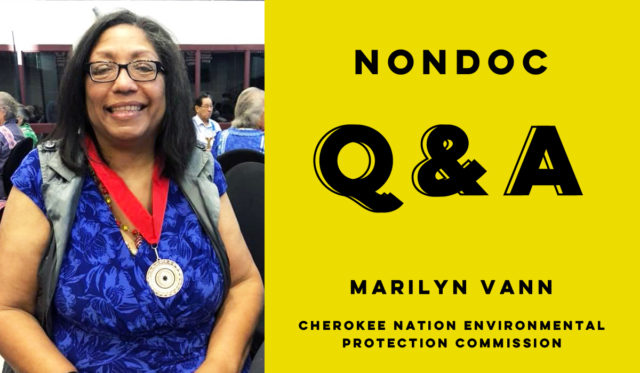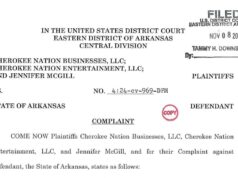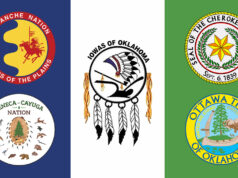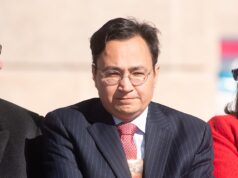

In September, Marilyn Vann was appointed to the Cherokee Nation’s Environmental Protection Commission, making her the first Freedman to hold a governmental office in the tribe.
Freedmen in Oklahoma, meaning those who are descended from African Americans held as slaves by tribal citizens, have historically been excluded from rights and citizenship in tribal nations.
Vann spent more than 30 years as an engineer at the U.S. Treasury Department. She has long been involved in the fight for recognition of Freedmen and is the president of the Descendant of Freedmen of the Five Civilized Tribes Association. In 2017, she was a plaintiff in a landmark case, Cherokee Nation v. Nash, in which a judge ruled that Cherokee Freedmen have full tribal citizenship rights — a decision subsequently affirmed by the tribe’s Supreme Court.
Vann made an unsuccessful run for Cherokee Tribal Council earlier this year, but she was then nominated to the commission by Principal Chief Chuck Hoskin Jr., who told NonDoc in 2019 that he has a “great relationship” with Freedmen leaders and that he is “mindful that we need to make sure all of our services and all of our accessibility to the government is done based on that core principle of equality.”
A University of Oklahoma graduate with a degree in petroleum engineering, Vann saw her appointment confirmed by the council on Sept. 13.)
In the following Q&A, Vann discusses the work of the commission, concerns for the Five Tribes of Oklahoma and challenges faced as a decedent of Cherokee Freedmen.
The following conversation has been lightly edited for style and clarity.
Now that you are appointed to the Cherokee Nation Environmental Protection Commission, what will be your goals moving forward? What does that mean to you?
As a commissioner, I wish to assist the tribe in reducing the amount of pollution occurring within the reservation. Too often, tribal reservations as well as other communities of color have been dumping grounds for industrial waste.
My position as a commissioner means that I have been entrusted to assist in making the tribe a healthier place but still allowing industrial and commercial projects to go forward or continue. It means that my talents and abilities and experience as an engineer have been recognized and will be used in the service of my tribal nation.
As far as my goals in tribal service, I am concentrating on fulfilling the responsibilities of the commission appointment. I have no plans to seek another position or office at the current time.
What are some of your biggest concerns for the Cherokee Nation?
My concerns for the Cherokee tribe are that there is insufficient unity. There are too many who look down on others because they are descendants of adopted citizens listed on the Dawes Rolls (Freedmen, Delaware, Shawnee, whites) and wish them to have inferior rights in the tribe. The tribe’s chances of surviving would have been less if there had historically been limited rights for new citizens in the tribe. Almost all tribes adopted others to replace those lost by disease or warfare prior to the European invasions. Historically, adopted citizens were expected to put their lives on the line for the tribe if invaded, just like everyone else.
Blood quantum disputes are a concern. The blood quantum was set up by the Dawes Commission as part of the federal plan to destroy the tribes and never would have come into being if the reservations had not been allowed as a step to set up the state of Oklahoma. Too many are not familiar with the 1866 treaty that is the basis of the rights of the Freedmen and adopted Delaware and Shawnees.
The 1880 census approved by the Cherokee Nation Council had no blood quantum for any tribal member, and Cherokee Indians who came in 1880-1881 to the Cherokee Nation reservation in eastern Oklahoma from the old reservation in North Carolina to once again be registered in the tribe had no blood quantum listed — although their clans were identified. There are also too many who look down on others who live outside the tribal reservation and even oppose such persons voting.
Although persons living outside the reservation are limited in participating in the majority of federally funded programs by federal law, tribal members regardless of where they live should be encouraged to be educated on tribal issues and participate as much as possible in tribal community organizations, history, language and culture, voting and know what programs they may participate in.
What are your concerns for other tribes?
Racism against Black tribal members/descendants and disunity persist in these tribes also. Within the Cherokee Nation as well as the other tribes, there is still anti-Blackness attitudes toward those who clearly have African ancestry, even if such a tribal member has a high degree of blood listed on a Certificate of Indian Blood. This anti-Black attitude is less in the Cherokee Nation than in some of the other tribes.
The Cherokee Nation tribal members also have less opposition to Freedmen. Although some prefer that Freedmen not be members of the tribe or at least be second-class citizens unable to hold office, many have accepted the 2017 federal court opinions upholding Cherokee Freedmen citizenship rights in the Cherokee Nation v. Nash and Vann case and the subsequent Cherokee Nation Supreme Court orders. In contrast, in the Seminole Nation case Seminole Nation v. Norton, the court upheld the 1866 treaty rights of the Freedmen, but the Seminole tribe has tried to do a run-around on the federal judge opinion by reissuing tribal membership cards for the Freedmen stating “Freedmen” and “voting privileges only” and barring them from accessing tribal services funded by the federal government.
The Seminole Nation even tried to block Indian Health Service and other tribes’ clinics from allowing Freedmen from acquiring vaccines during the height of the pandemic when the vaccines were available at a much earlier date through tribal and IHS supplies than the state supplies.
On social media, on some pages, one will see some tribal members are quick to attack the Freedmen as “non-Indians forced on the tribe” or persons with limited tribal culture. Also, in others of the Five Tribes, there are some constitutional requirements that officeholders have one-fourth blood Certificate of Degree of Indian Blood to hold elected office, especially in the principal chief and deputy chief position. This has caused resentment among many tribal members, who are barred from holding office due to blood quantum requirements. In all five tribes, persons with one-fourth blood quantum or less are the majority of the tribe. These existing laws create apathy and resentment within the tribes.
As a Freedmen descendant, what are some of the biggest issues you have faced throughout your career?
I would say that issues include a lack of knowledge both within and outside of the tribes of the history of the tribes so far as the legal rights and contributions of the Freedmen. Another one was the resistance of some members of the press and elected officials’ staff to research the rights of the Freedmen. Some preferred to automatically accept positions of tribal leaders opposed to Freedmen citizenship. Possibly this is because the Freedmen people as a whole are impoverished people and control no casinos.
There has been a resistance to accept persons of African ancestry as having tribal rights and history — in part because the media often had whites portraying Indians on TV or movies, and documentaries about the Trail of Tears or other historical events did not show any persons of African ancestry. Many Civil War buffs are unaware that Freedmen such as Sugar George, Picket Rentie, and Wheat Baldrige fought against the Confederacy while serving in the Indian Home Guards during the Civil War.
The fact that the Oklahoma Legislature’s Senate Bill 1 was the first law passed in Oklahoma after statehood in 1907 and classified Indians with no African ancestry as legally white and not subject to segregation laws set up a situation whereby Blacks, including tribal Blacks, were seen as legally and socially inferior to all others in the state of Oklahoma. Some tribal members with no African ancestry still do not want to associate with their “negro/Freedmen” relatives, except perhaps at a family funeral, even though it is 2021 and not 1921.
What advice would you give to other Freedmen who face barriers?
What has been the hardest thing to overcome during the COVID-19 pandemic?
Not being able to fellowship with others at church, community meetings, etc. COVID-19 has also had a detrimental effect on fundraising for nonprofits.
Has the last year impacted your community differently from others? How do you overcome those challenges?
I don’t think that the Freedmen community has had impacts different from other communities. We do use social media, Zoom, etc. to get around the COVID-19 as much as possible.
As president of the Descendants of Freedmen of the Five Civilized Tribes Association, what are some of the challenges you’ve faced?
Both historical and current racism. Lack of understanding of tribal history and federal and tribal law. Some persons wish for their full tribal rights to be enforced but are unwilling to sacrifice their own money and time to make it happen. Some politicians understand the rights of the Freedmen but will not assist because they are receiving large contributions from tribal governments and leaders discriminating against Freedmen.
Are there any accomplishments you’re particularly proud of?
The biggest accomplishment is that the Cherokee Freedmen tribal members’ membership has been reaffirmed through Cherokee Nation V. Nash and Vann, including the right to hold office. In 2007, there were 2,800 Cherokee Freedmen tribal members facing dis-enrollment. Now, in 2021, there are about 8,500 Cherokee Freedmen tribal members. Now there have been many books, articles and documentaries discussing the Freedmen’s 1866 treaty rights. There even was legislation in the Native American Housing Assistance and Self-determination Act of 1996 and the reauthorization of the act in 2008 (sponsored by former House Financial Services Committee Chairman Barney Frank) which tied the ability of the Cherokee Nation to receive NAHASDA funds to Freedmen tribal membership rights while litigation and/or settlement negotiations continued. Today, in 2021, Chairwoman Maxine Waters (D-CA43) of the House Financial Services Committee also is working to bring bills into law that will better protect enforcement of Freedmen 1866 treaty rights.




















